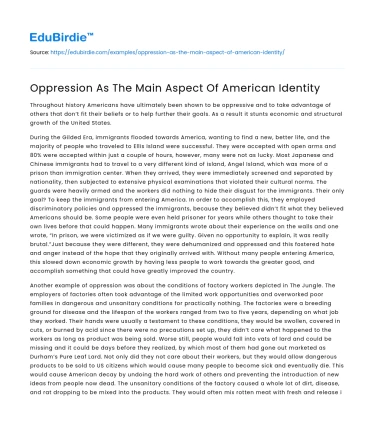Throughout history Americans have ultimately been shown to be oppressive and to take advantage of others that don’t fit their beliefs or to help further their goals. As a result it stunts economic and structural growth of the United States.
During the Gilded Era, immigrants flooded towards America, wanting to find a new, better life, and the majority of people who traveled to Ellis Island were successful. They were accepted with open arms and 80% were accepted within just a couple of hours, however, many were not as lucky. Most Japanese and Chinese immigrants had to travel to a very different kind of island, Angel Island, which was more of a prison than immigration center. When they arrived, they were immediately screened and separated by nationality, then subjected to extensive physical examinations that violated their cultural norms. The guards were heavily armed and the workers did nothing to hide their disgust for the immigrants. Their only goal? To keep the immigrants from entering America. In order to accomplish this, they employed discriminatory policies and oppressed the immigrants, because they believed didn’t fit what they believed Americans should be. Some people were even held prisoner for years while others thought to take their own lives before that could happen. Many immigrants wrote about their experience on the walls and one wrote, “In prison, we were victimized as if we were guilty. Given no opportunity to explain, it was really brutal.”Just because they were different, they were dehumanized and oppressed and this fostered hate and anger instead of the hope that they originally arrived with. Without many people entering America, this slowed down economic growth by having less people to work towards the greater good, and accomplish something that could have greatly improved the country.
Save your time!
We can take care of your essay
- Proper editing and formatting
- Free revision, title page, and bibliography
- Flexible prices and money-back guarantee
Another example of oppression was about the conditions of factory workers depicted in The Jungle. The employers of factories often took advantage of the limited work opportunities and overworked poor families in dangerous and unsanitary conditions for practically nothing. The factories were a breeding ground for disease and the lifespan of the workers ranged from two to five years, depending on what job they worked. Their hands were usually a testament to these conditions, they would be swollen, covered in cuts, or burned by acid since there were no precautions set up, they didn’t care what happened to the workers as long as product was being sold. Worse still, people would fall into vats of lard and could be missing and it could be days before they realized, by which most of them had gone out marketed as Durham’s Pure Leaf Lard. Not only did they not care about their workers, but they would allow dangerous products to be sold to US citizens which would cause many people to become sick and eventually die. This would cause American decay by undoing the hard work of others and preventing the introduction of new ideas from people now dead. The unsanitary conditions of the factory caused a whole lot of dirt, disease, and rat dropping to be mixed into the products. They would often mix rotten meat with fresh and release it, occasionally labeling some as special and charging more for each pound. Rat meat and poison were also frequently mixed into the meat because though they set out poison to kill the rats, they didn’t bother taking either out. In order to achieve the money and power they desired, they attempted to dehumanize and oppress their workers, which caused the deaths of many people.
The Adventure of Huckleberry Finn is a story about Jim, a slave, and Huck, a white man, each escaping from their own forms of oppression, for Jim as a slave, and Huck, as a victim of abuse. As they are both escaping down the Mississippi river, they run into each other and decide to go down river to Cairo, Illinois, where the Ohio River meets the Mississippi, and travel downriver to a free state. In this novel, it portrays how not only a group of people impacts others, but the cultural norms as well. As they travel together down the river and experience new situations, Huck battles with his feelings about Jim and how he has been raised to think about slaves. On one occasion, he decides on turning Jim in at the next town, because of how he is helping the slave of someone who was good to him escape and he feels like he is doing something wrong, but when the opportunity arises and he is questioned by the townsman further up the river, he lies to keep Jim safe. Later he thinks,“I do believe he cared just as much for his people as white folks does for their’n. It don’t seem natural, but I reckon it’s so.” Which shows how far he’s come just from spending time with Jim. This shows that although oppression has detrimental effects and slows down progress, that they can lead to some opportunities that allow for understanding and unity. It also shows that although Americans are oppressive, we still have the opportunity to change for the better.
Americans are constantly finding new ways to dehumanize and oppress a group of people for their own goals and beliefs. Whether it’s for racial beliefs or for money and power, it still sets the US growth back in many ways, however, even though Americans have mainly been shown to be oppressive and to take advantage of others, it can cause people to come together and learn to accept their differences. There are many different examples of oppression scattered all throughout history, and each time we learn something different from the consequences, that even though they can be horrific, an opportunity for a positive change comes from that.






 Stuck on your essay?
Stuck on your essay?

